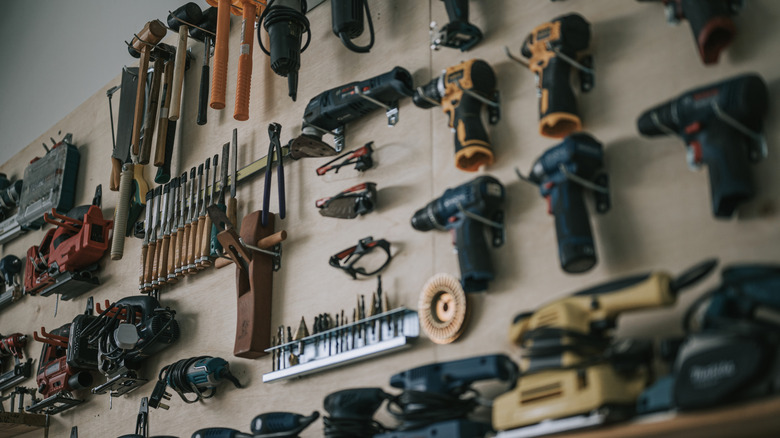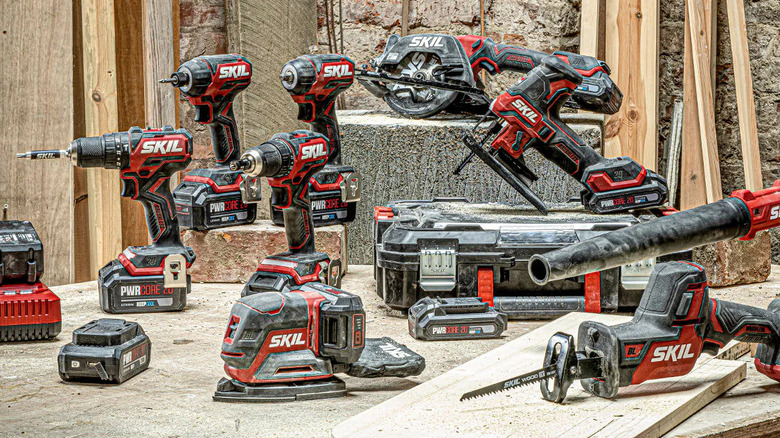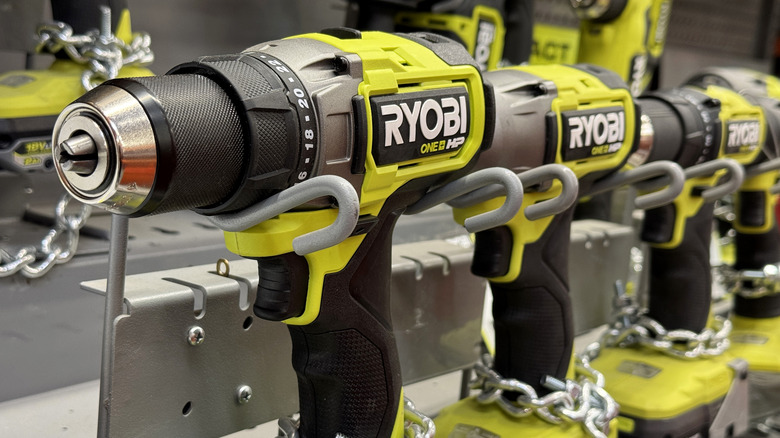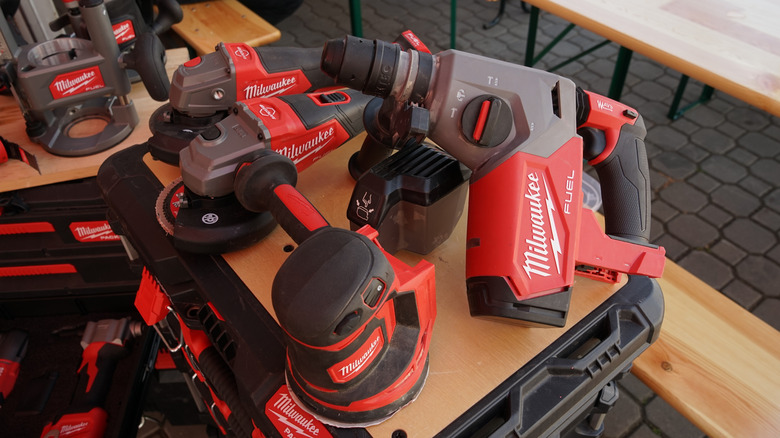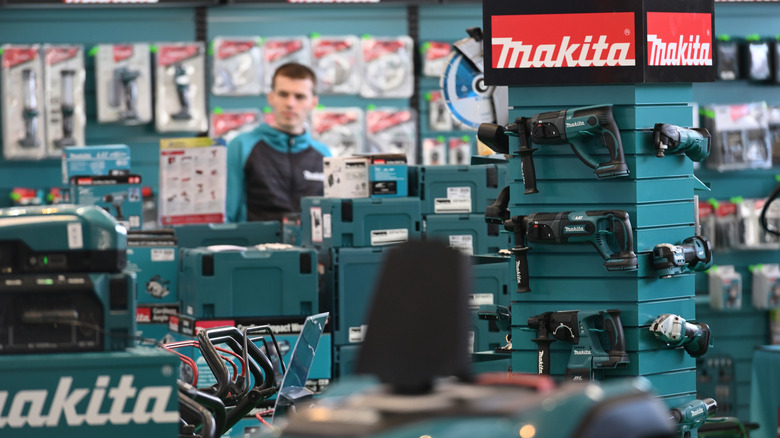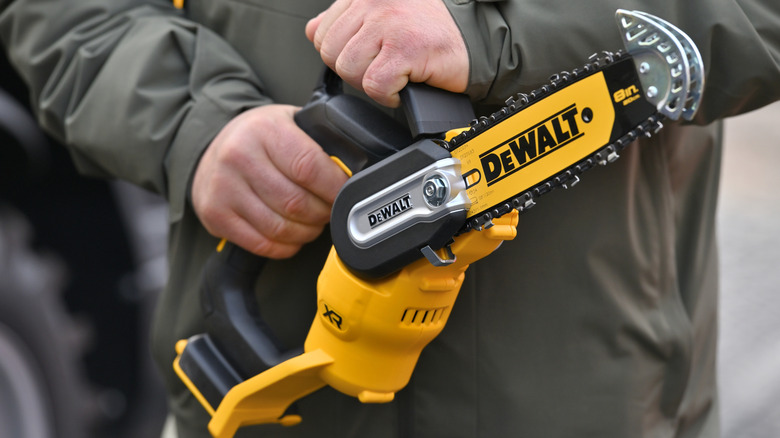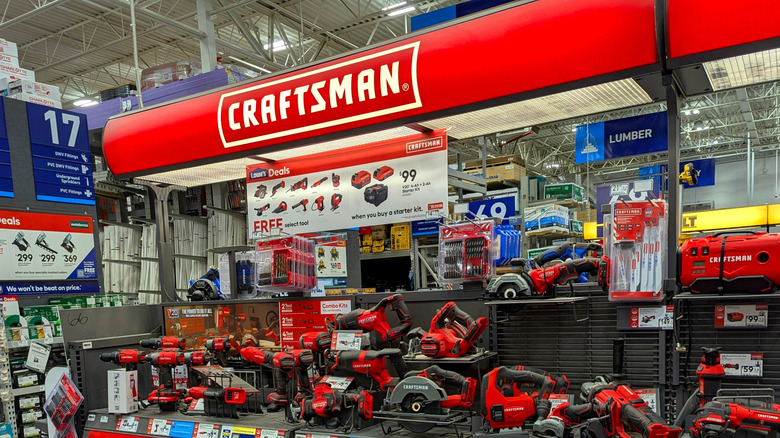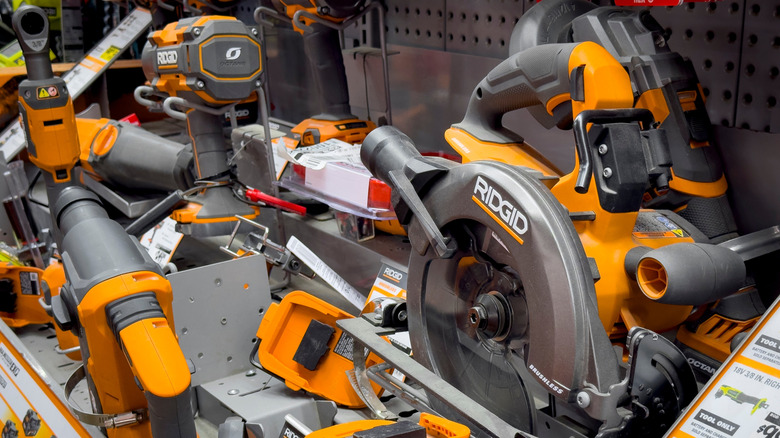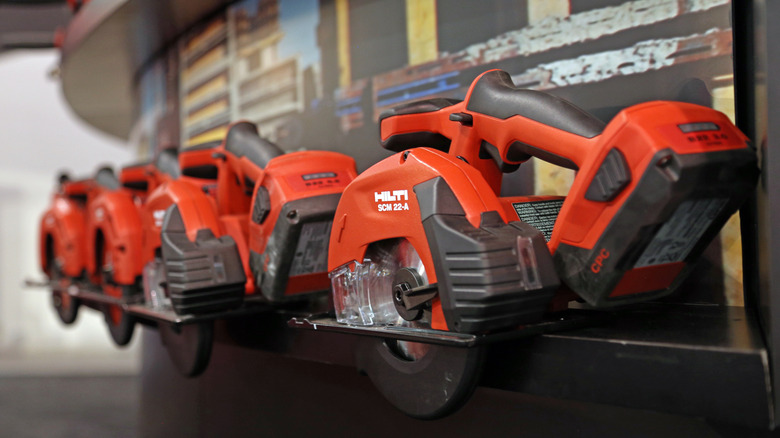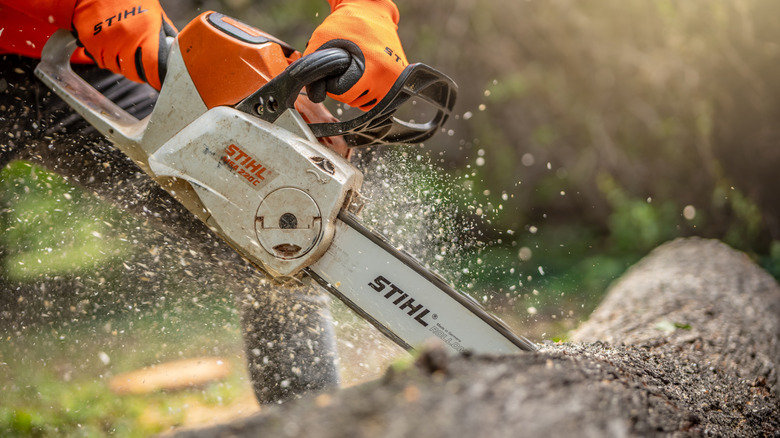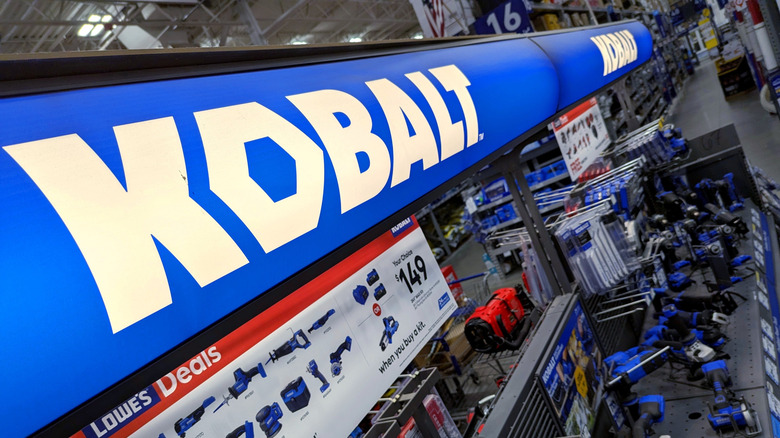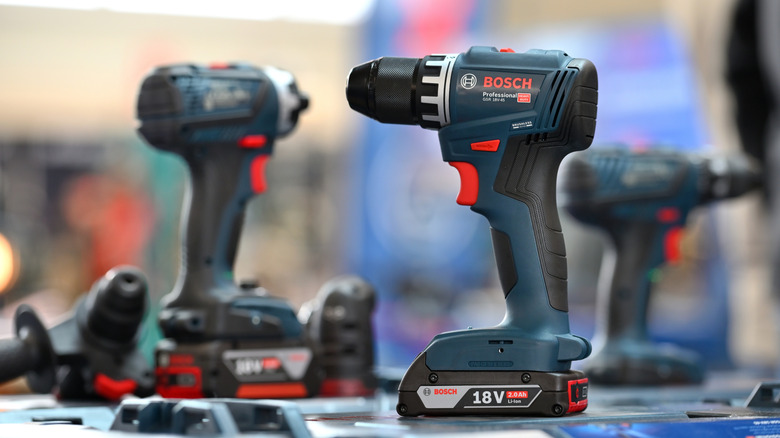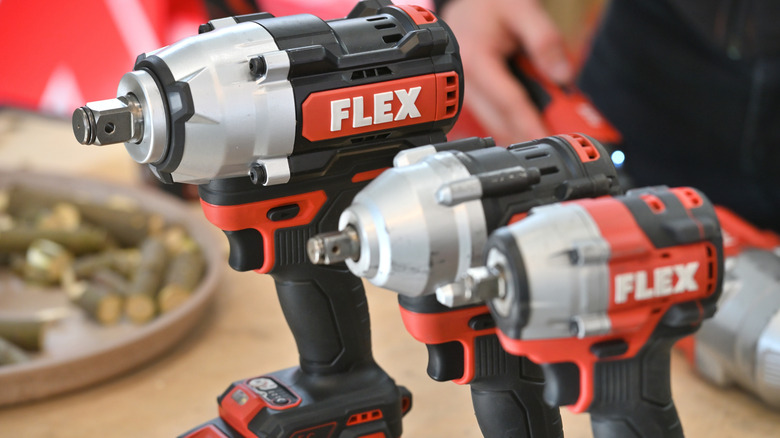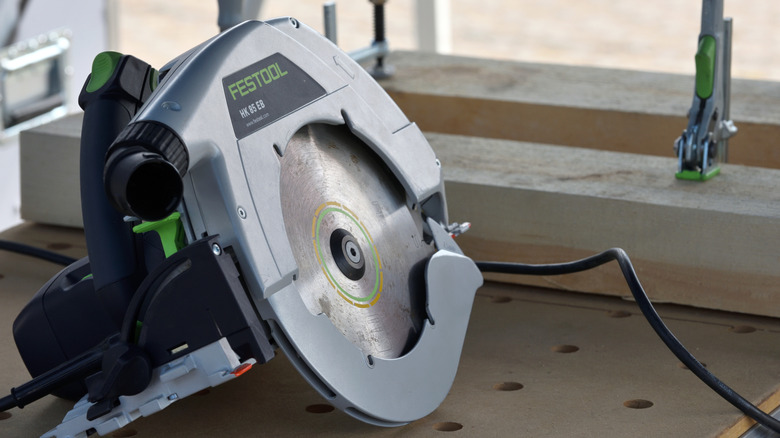Here's Who Really Owns All Of The Major Tool Brands
The power tool market is crowded with a plethora of brands claiming to offer the best performance or value for money, and sometimes choosing between them can be a matter of simply picking your favorite brand. Most regular tool users have one or more brands they favor and others they prefer to avoid, but many are unsure which corporation benefits when they purchase tools from a specific brand. While in some cases, tool brands are independent companies with decades of history, in other cases, what seem to be familiar names are in fact owned by international conglomerates that you might never have heard of.
Several of the biggest American toolmaking brands are no longer owned by American companies, having been the subject of acquisitions or mergers. Some are recent, while others have been foreign-owned for decades, and it can be hard to keep track of who owns what. These major tool brands all have decades of history and are well-known names in the American tool market, but who owns the name may surprise you.
Skil
Skil recently celebrated its 100th anniversary, having been founded in 1924. The brand was the result of a collaboration between Joseph W. Sullivan and Edmond Michel, with the latter inventing an electric handsaw after watching workers cut sugar cane at a plantation. The tool was the first of its kind and was intended to help those workers cut through cane faster and easier, but it eventually became popular for a much wider variety of uses. Saws remain a key part of the brand's tool lineup today, but it has also expanded its range to offer a broad variety of products spanning everything from lawnmowers to measuring tools.
In 1996, Skil was bought by the German Bosch Group, and remained under the group's ownership for more than two decades. During much of that time, Chinese toolmaker Chervon Group acted as a supplier for Bosch and eventually entered into a partnership in the Chinese market. By 2016, Chervon had announced its intention to buy the Skil brand outright from Bosch, and in 2017, that acquisition was completed. Since then, Skil has been a wholly owned subsidiary of the Chervon Group and is one of several familiar tool brands that the Chinese company owns.
Ryobi
While it is far from the oldest toolmaking brand on the market, Ryobi can trace its roots back further than many enthusiasts might realize. The brand was first founded in Japan in 1943 as Ryobi Seisakusho Co., Ltd. in Fuchu, a city in Hiroshima Prefecture. It initially made die-cast parts for the Japanese military, but by the late 1940s, it had pivoted towards making parts for Japan's automobile industry. Over the next decade or so, the company grew significantly, and by the 1960s, Ryobi had expanded into the production of printing presses, cameras (sold under the Minolta brand), and power tools.
In 1985, Ryobi launched its first manufacturing base in the U.S., but the end of the Japanese economic bubble during the 1990s saw many of its production divisions become unprofitable. To keep itself afloat as a company, Ryobi was forced to sell off a number of those divisions, including its North American power tools business. The power tools operation was acquired in 2000 by Techtronic Industries (TTI) and remains owned by the same company today. Much like Chervon, China-based TTI owns multiple other brands that will be recognizable to American buyers, including Homelite and Hoover.
Milwaukee
The TTI portfolio includes the likes of Ryobi and Homelite, but arguably the most well-regarded brand under its ownership is Milwaukee. Techtronic acquired Milwaukee in 2005, but the brand was first founded back in 1924. Its earliest success came when Henry Ford asked the company to develop a new power drill to help speed up his automobile production lines. In response, Milwaukee's founder developed the Hole Shooter, a ¼-inch one-handed drill that fit Ford's brief perfectly.
The company brought out new tools over the following years, with 1949 proving to be a particularly important year for the company. That year, Milwaukee launched a sander/grinder and a ½-inch right-angle drill, which both proved highly popular. The Sawzall was launched in 1951 and ended up being an even bigger sales hit. Various other influential tools were launched over the next three decades, but one of the most significant changes arrived when TTI acquired the company in the mid-'00s. Shortly after the acquisition, the brand launched its first cordless tool range with interchangeable batteries, a technology that has become a huge part of the brand's appeal in the years since.
Makita
Not every tool brand is under the umbrella of another company. Japanese brand Makita remains independent after more than 100 years of operation, and still operates out of the same head office location in Anjo that it has occupied since 1945. The brand itself is even older, being initially founded in 1915. It has always specialized in electrical equipment, but initially built transformers and lighting equipment, as well as motors. Its 1958 electric planer was a first for a Japanese toolmaker, and its success saw Makita rebranded as primarily an electric power tool company the following year.
The same year, its first power tool exports began. Initially, Makita exported its tools to Australia, but it slowly expanded its international reach. The American division of Makita was formed in 1970, with new ventures in Europe also established over the next few years. The brand's first battery-powered tool, the 6010D drill, arrived in 1978, and in less than a decade, Makita had also launched its first battery-powered outdoor tool, the UH3000D hedge trimmer.
The company has further expanded in Europe and Asia in more recent decades, and now makes its power tools in a variety of locations around the world. It produced its last combustion-powered tool in 2022, and since then, its entire global power tool lineup has consisted of electric tools.
DeWalt
One of the longest-lived names in the American tool industry is DeWalt, which, like its rival Milwaukee, was first founded in 1924. The brand's yellow and black tools can be found on jobsites across America. Unlike Milwaukee, the brand is still owned by an American company. DeWalt was first founded by Raymond DeWalt, who developed a unique adjustable radial arm saw. Despite bearing his name, the DeWalt company wasn't owned by Raymond for long. Shortly after founding it, he sold it to two investors, Isaac Rutt and Paul Gardner, who were responsible for developing the company during its early years.
In 1960, Black & Decker acquired DeWalt. From then, it would be over three decades until the next pivotal moment in the company's history. That moment was the launch of DeWalt's first portable electric power tool range in 1992, which was rapidly expanded to include new products across the mid-'90s. It took until 2010 for the brand to launch its 12V Max line of interchangeable battery-powered electric tools, the same year its parent company merged with Stanley to form Stanley Black & Decker. It remains under the ownership of this merged company today.
Craftsman
In addition to owning DeWalt, Stanley Black & Decker also owns a range of other tool brands. One of the biggest is Craftsman, which first launched in 1927. It was originally created by Sears as an in-house tool brand, and by 1929, it had introduced its first electric power tools. Its lawnmower range wasn't far behind, hitting the Sears catalog in 1934, although riding mowers were not introduced until 1953. Other outdoor tools like the WeedWacker played a key part in broadening its appeal throughout the middle of the century, with Craftsman selling over a million WeedWackers by 1978.
Stanley Black & Decker acquired Craftsman in 2017 as one of several additions to its stable of brands that year. The same company also purchased the Irwin brand in 2017, which is even older than DeWalt or Craftsman, having been founded in 1885. Lenox was also acquired by Stanley Black & Decker the same year. In addition, automotive tool brand Mac Tools is also under the same corporate umbrella, and unlike many of its rivals, it still makes some of its tools in America.
Ridgid
The first Ridgid product, a heavy-duty pipe wrench, left the factory in 1923. The company was founded in Elyria, Ohio, and made a variety of tools, including pipe cutters and threading machines, in its early years. In 1966, it was acquired by Emerson Electric, with the brand remaining under the same ownership today. However, the orange Ridgid power tools you might recognize from Home Depot are actually licensed by the Chinese toolmaking giant TTI, and are made in various locations around the world.
Ridgid is just one of more than a dozen tool and appliance brands that TTI owns or licenses. It also owns Stiletto, Hart, Imperial Blades, and Empire Level, alongside previously mentioned major brands such as Milwaukee and Ryobi. That makes TTI arguably one of the most influential toolmaking corporations in the American market, even if there's a good chance that many of their most loyal customers might not recognize the TTI brand itself.
Hilti
It's safe to assume that the vast majority of people couldn't point to Liechtenstein on a map. It is both one of the smallest countries in the world and a very wealthy one. The median salary in Liechtenstein is around $8,700 per month, according to 2024 data (equivalent to around $104,400 annually). This tiny, prosperous nation is also the birthplace of Hilti tools, which was founded by Eugen and Martin Hilti in 1941.
The brand's first power-actuated nailer was launched in 1953, but was fundamentally redesigned in 1957 to make it safer to use. This redesigned tool would turn out to be Hilti's first hit product, and the company quickly expanded to overseas markets to capitalize on its popularity.
Despite expanding its tool range and launching in a wide variety of markets over the decades, at its core, Hilti remains a family-run business today. In the last decade, the brand has completed several acquisitions in Europe to expand its business into everything from fire suppression systems to cable manufacturing. Still, its power tool lineup continues to be the most recognizable part of its range.
Stihl
German power tool manufacturer Stihl is another brand that has remained independent throughout its history. It's still owned by the Stihl family, with family members currently splitting ownership of the firm. Stihl has been in business since 1926, and is probably best known for its chainsaw range. It developed the first automatic bar and chain oiling system, a unique centrifugal clutch, and a tool-free chain adjuster, among many other innovations.
Today, the company offers a lot more than just chainsaws. Alongside its conventional range of outdoor-focused power tools, it also offers a range of Kombi attachments that can be used interchangeably with a single power head. While certain other tool brands have moved away from manufacturing gas-powered tools and transitioned to an all-electric range, Stihl still offers a comprehensive range of both gas and electric tools. Many of its American-market products are also made in America at the brand's facility in Virginia Beach, VA.
Kobalt
Kobalt doesn't have the same history as many of the other big brands, having only been launched in 1998, but it has quickly developed a solid reputation. It was originally founded as a mechanic's tools brand, and was a joint partnership between big-box retailer Lowe's and J.H. Williams, a division of American toolmaker Snap-On. Lowe's quickly broadened Kobalt's product range, and by 2014, the brand offered more than 1,700 products, including power tools, outdoor tools, and accessories.
Over the years, Lowe's has worked with a variety of suppliers to make Kobalt tools and products, but many of its current power tools are reportedly made by Chervon. The brand continues to be exclusive to Lowe's and currently offers a huge range of products from snow blowers to saws. Its interchangeable battery pack systems are a key part of its range, with the brand currently offering a 24V Max line alongside a 40 Max and 80V Max line.
Bosch
Probably the only toolmaker to be majority owned by a non-profit foundation, Bosch's ownership structure is a strange one. The company is entirely privately owned, with 94% of its shares held by the Robert Bosch Stiftung GmbH foundation. This non-profit foundation takes the dividends it receives from its ownership of the Bosch manufacturing operation and uses the money for philanthropic work. It supports a wide variety of causes, including peace initiatives in various areas of conflict across the world and funding a number of disability rights organizations.
The foundation owns the vast majority of Bosch's operations, but of the remaining 6%, around 5% is split between various Bosch family members, and around 1% of the shares are owned by the company itself. Robert Bosch GmbH — that is, the profit-making company — also owns the Dremel tool brand, which it acquired in 1993. As well as being a big name in the tool world, Bosch is also the largest European automotive parts supplier, in addition to creating everything from thermal plants to sneaker authentication software.
Flex
Founded as Ackermann + Schmitt in 1922 in a town near Stuttgart, Germany, Flex took on its current name in 1996. It was initially formed as a way for its two inventor founders to market their latest creation, a grinder with a flexible shaft. The brand also claims to have invented the first high-speed angle grinder in 1954. Since then, it has branched out to offer a huge range of other power tools. The company has been owned by Chervon since 2013, but it operates more independently than many of the conglomerate's other brands.
Flex retains a German manufacturing plant and is pitched squarely at professionals rather than being home user-oriented. Flex forms just one part of Chervon's overall portfolio, with the company also owning the Ego outdoor power tool brand, making tools for the Kobalt brand, and owning Skil, as previously mentioned. In Asia, Chervon also sells professional-grade tools under the Devon brand.
Festool
A German brand with a century of history, Festool was originally formed as Fezer & Stoll in 1925. In its fledgling days, it primarily made saws of various kinds, with its SB126 circular saw being among its earliest successes. During the '30s, the company would expand its range to include more tools and first use the Festo name. After the Second World War, the toolmaker got a significant boost as new tools were needed to help rebuild Germany's tattered infrastructure. As well as continuing to sell its core line of tools, Festo continued the development of new ones, with the Rutscher sander being one of its most notable products.
In the late '70s, Festo continued its run of innovation with the launch of the Rotex sander. By 1992, its owners had decided that it was time for the brand to receive a marketing makeover, and that included a slightly different name: Festo Tooltechnic. The name didn't last long, and in 2000, it was renamed Festool. A further reshuffle saw Festool become a subsidiary brand of TTS Tooltechnic Systems, alongside its parent company's recent acquisitions, SawStop and Shaper. Throughout the name changes, TTS/Festool/Festo has remained owned by the same family, and is still headquartered in the same region of Germany in which it was founded a century ago.
